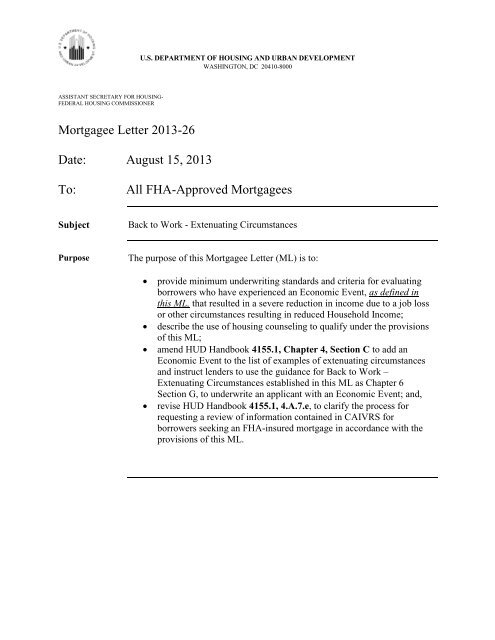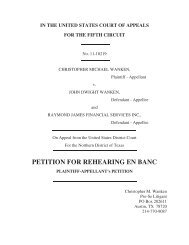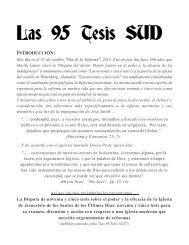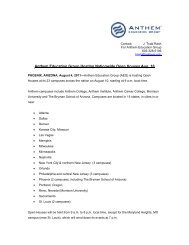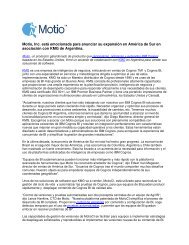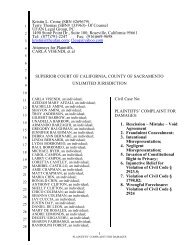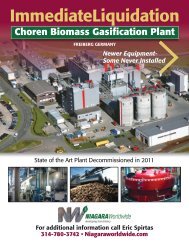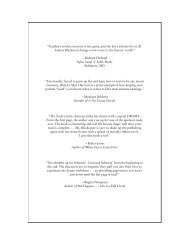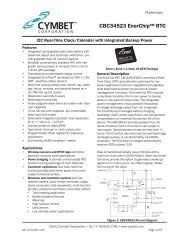Back to Work - Extenuating Circumstances - HUD
Back to Work - Extenuating Circumstances - HUD
Back to Work - Extenuating Circumstances - HUD
Create successful ePaper yourself
Turn your PDF publications into a flip-book with our unique Google optimized e-Paper software.
U.S. DEPARTMENT OF HOUSING AND URBAN DEVELOPMENT<br />
WASHINGTON, DC 20410-8000<br />
ASSISTANT SECRETARY FOR HOUSING-<br />
FEDERAL HOUSING COMMISSIONER<br />
Mortgagee Letter 2013-26<br />
Date: August 15, 2013<br />
To:<br />
All FHA-Approved Mortgagees<br />
Subject<br />
<strong>Back</strong> <strong>to</strong> <strong>Work</strong> - <strong>Extenuating</strong> <strong>Circumstances</strong><br />
Purpose<br />
The purpose of this Mortgagee Letter (ML) is <strong>to</strong>:<br />
<br />
<br />
<br />
<br />
provide minimum underwriting standards and criteria for evaluating<br />
borrowers who have experienced an Economic Event, as defined in<br />
this ML, that resulted in a severe reduction in income due <strong>to</strong> a job loss<br />
or other circumstances resulting in reduced Household Income;<br />
describe the use of housing counseling <strong>to</strong> qualify under the provisions<br />
of this ML;<br />
amend <strong>HUD</strong> Handbook 4155.1, Chapter 4, Section C <strong>to</strong> add an<br />
Economic Event <strong>to</strong> the list of examples of extenuating circumstances<br />
and instruct lenders <strong>to</strong> use the guidance for <strong>Back</strong> <strong>to</strong> <strong>Work</strong> –<br />
<strong>Extenuating</strong> <strong>Circumstances</strong> established in this ML as Chapter 6<br />
Section G, <strong>to</strong> underwrite an applicant with an Economic Event; and,<br />
revise <strong>HUD</strong> Handbook 4155.1, 4.A.7.e, <strong>to</strong> clarify the process for<br />
requesting a review of information contained in CAIVRS for<br />
borrowers seeking an FHA-insured mortgage in accordance with the<br />
provisions of this ML.
Mortgagee Letter 2013-26 Continued<br />
Introduction<br />
FHA is continuing its commitment <strong>to</strong> fully evaluate borrowers who have<br />
experienced periods of financial difficulty due <strong>to</strong> extenuating circumstances.<br />
As a result of the recent recession many borrowers who experienced<br />
unemployment or other severe reductions in income, were unable <strong>to</strong> make<br />
their monthly mortgage payments, and ultimately lost their homes <strong>to</strong> a preforeclosure<br />
sale, deed-in-lieu, or foreclosure. Some borrowers were forced <strong>to</strong><br />
file for bankruptcy <strong>to</strong> discharge or restructure their debts. Because of these<br />
recent recession-related periods of financial difficulty, borrowers’ credit has<br />
been negatively affected. FHA recognizes the hardships faced by these<br />
borrowers, and realizes that their credit his<strong>to</strong>ries may not fully reflect their<br />
true ability or propensity <strong>to</strong> repay a mortgage.<br />
To that end, FHA is allowing for the consideration of borrowers who have<br />
experienced an Economic Event and can document that:<br />
certain credit impairments were the result of a Loss of Employment or<br />
a significant loss of Household Income beyond the borrower’s control;<br />
the borrower has demonstrated full recovery from the event; and,<br />
the borrower has completed housing counseling.<br />
Housing counseling is an important resource for both first-time home buyers<br />
and repeat home owners. Housing counseling enables borrowers <strong>to</strong> better<br />
understand their loan options and obligations, and assists borrowers in the<br />
creation and assessment of their household budget, accessing reliable<br />
information and resources, avoiding scams, and being better prepared for<br />
future financial shocks, among other benefits <strong>to</strong> the borrower.<br />
Effective Date<br />
The guidance in this ML is effective for case numbers assigned on or after<br />
August 15, 2013 through September 30, 2016.<br />
2
Mortgagee Letter 2013-26 Continued<br />
Affected<br />
Programs<br />
<strong>HUD</strong> 4155.1, Mortgage Credit Analysis for Mortgage Insurance<br />
Add Chapter 6 section G, “<strong>Back</strong> <strong>to</strong> <strong>Work</strong> – <strong>Extenuating</strong><br />
<strong>Circumstances</strong>,” and the guidance in this ML in its entirety <strong>to</strong> this<br />
new section.<br />
Add <strong>to</strong> section 4.C.2.f, Previous Mortgage Foreclosure, an<br />
Economic Event <strong>to</strong> the list of examples of extenuating<br />
circumstances and instruct lenders <strong>to</strong> use alternative guidance in<br />
Chapter 6.<br />
Add <strong>to</strong> section 4.C.2.g, Chapter 7 Bankruptcy, instructions <strong>to</strong><br />
lenders <strong>to</strong> use alternative guidance in Chapter 6 when the<br />
extenuating circumstance is a result of an Economic Event.<br />
Note: This ML will serve as Section G until the 4155.1 Handbook can be<br />
updated.<br />
Applicability<br />
The guidance in this ML is applicable <strong>to</strong> purchase money mortgages in all<br />
FHA programs with the exception of Home Equity Conversion Mortgages.<br />
Lenders must use the provisions of this ML when considering a borrower<br />
who experienced an Economic Event, as defined in this ML, which resulted in<br />
a foreclosure, short sale, bankruptcy or other negative impact on their credit,<br />
and whose application has been issued a “Refer” recommendation by TOTAL<br />
Scorecard, or received an “Accept/Approve” but is manually downgraded.<br />
In addition <strong>to</strong> meeting the guidelines set forth in this ML, loans originated<br />
using these criteria must meet all other applicable FHA eligibility and policy<br />
criteria. Lenders remain responsible for determining whether the borrower<br />
meets all other <strong>HUD</strong> requirements before approving the loan.<br />
3
Mortgagee Letter 2013-26 Continued<br />
Eligibility for<br />
Borrowers<br />
affected by an<br />
Economic<br />
Event<br />
Borrowers that may be otherwise ineligible for an FHA-insured mortgage due<br />
<strong>to</strong> FHA’s waiting period for bankruptcies, foreclosures, deeds-in-lieu, and<br />
short sales, as well as delinquencies and/or indications of deroga<strong>to</strong>ry credit,<br />
including collections and judgments, may be eligible for an FHA-insured<br />
mortgage if the borrower<br />
can document that the delinquencies and/or indications of deroga<strong>to</strong>ry<br />
credit are the result of an Economic Event as defined in this ML,<br />
has completed satisfac<strong>to</strong>ry Housing Counseling, as described in this<br />
ML, and<br />
meets all other <strong>HUD</strong> requirements.<br />
Definitions<br />
An Economic Event is any occurrence beyond the borrower’s control<br />
that results in Loss of Employment, Loss of Income, or a combination<br />
of both, which causes a reduction in the borrower’s Household<br />
Income of twenty (20) percent or more for a period of at least six (6)<br />
months.<br />
The Onset of an Economic Event is the month of Loss of<br />
Employment/Income.<br />
Recovery from an Economic Event is the re-establishment of<br />
Satisfac<strong>to</strong>ry Credit (as defined on page 5 of this ML) for a minimum<br />
of twelve (12) months.<br />
The term borrower includes borrowers and co-borrower.<br />
Borrower Household Income means the gross income of the borrower<br />
and all Household Members, as defined below, for purposes of<br />
assessing loss of income. The gross income of each Household<br />
Member must be computed in accordance with FHA income<br />
requirements.<br />
Note: Household Member, for the purpose of this ML, means an<br />
individual residing at the borrower’s primary residence at the time of<br />
the Economic Event and who was a co-borrower on the borrower’s<br />
previous mortgage.<br />
4
Mortgagee Letter 2013-26 Continued<br />
Eligibility for<br />
Borrowers<br />
affected by an<br />
Economic<br />
Event-<br />
Continued<br />
Note: Borrower Household Income is used for the purpose of defining<br />
an Economic Event. Only the income from the borrower, not<br />
Household Income, may be used as Effective Income for the purpose<br />
of qualifying for the new loan.<br />
Housing Counseling, for purposes of this ML, means counseling from<br />
a <strong>HUD</strong>-approved housing counseling agency related <strong>to</strong><br />
homeownership and residential mortgage loans that is provided in<br />
accordance with 24 C.F.R. part 214 “Housing Counseling Program”<br />
and satisfies the requirements identified in Satisfac<strong>to</strong>ry Housing<br />
Counseling.<br />
Satisfac<strong>to</strong>ry Credit<br />
1. Satisfac<strong>to</strong>ry Credit: Requirements<br />
The lender may deem a borrower <strong>to</strong> have Satisfac<strong>to</strong>ry Credit if:<br />
<br />
<br />
<br />
the borrower’s credit his<strong>to</strong>ry is clear of late housing or<br />
installment debt payments, and major deroga<strong>to</strong>ry credit issues<br />
on revolving accounts;<br />
any open mortgage is current and shows twelve (12) months<br />
satisfac<strong>to</strong>ry payment his<strong>to</strong>ry. Mortgages may have been<br />
brought current through loan modification, which may be<br />
“temporary” or “permanent” so long as all payments have been<br />
documented as being received in accordance with the<br />
modification agreement(s); and<br />
the borrower meets the requirements of this ML.<br />
5
Mortgagee Letter 2013-26 Continued<br />
Eligibility for<br />
Borrowers<br />
affected by an<br />
Economic<br />
Event-<br />
Continued<br />
When evaluating a borrower with non-traditional credit his<strong>to</strong>ry, the lender<br />
may deem a borrower <strong>to</strong> have Satisfac<strong>to</strong>ry Credit if the borrower’s nontraditional<br />
credit his<strong>to</strong>ry covering at least twelve (12) months in duration<br />
includes:<br />
<br />
<br />
<br />
no his<strong>to</strong>ry of delinquency on rental housing payments; and<br />
no more than one thirty (30) days delinquency on payments due <strong>to</strong><br />
other credi<strong>to</strong>rs; and<br />
no collection accounts/court records reporting (other than medical<br />
and/or identity theft).<br />
Refer <strong>to</strong> Handbook 4155.1 Chapter 4 Section C for more information on<br />
analyzing a borrower with non-traditional credit his<strong>to</strong>ry.<br />
2. Satisfac<strong>to</strong>ry Credit: Required Documentation<br />
The lender must verify and document a reduction in the borrower’s<br />
Household Income of twenty (20) percent or more for a period of at least six<br />
(6) months that resulted from the Loss of Employment, Loss of Income, or a<br />
combination of both.<br />
A. Loss of Employment<br />
The lender must verify and document the Loss of Employment by obtaining:<br />
<br />
A written Verification of Employment (VOE) evidencing the<br />
termination date or in cases where the prior employer is no longer in<br />
business:<br />
o a written termination notice, or<br />
o other publicly available documentation of the business closure,<br />
and<br />
o documentation of receipt of unemployment income.<br />
6
Mortgagee Letter 2013-26 Continued<br />
Eligibility for<br />
Borrowers<br />
affected by an<br />
Economic<br />
Event-<br />
Continued<br />
B. Loss of Income<br />
The lender must verify and document the Borrower’s Household Income prior<br />
<strong>to</strong> Loss of Income by obtaining:<br />
a written VOE evidencing prior income; or<br />
signed tax returns or W-2s evidencing prior income.<br />
For a Loss of Income based on seasonal employment, the lender must verify<br />
and document a two year his<strong>to</strong>ry of seasonal employment in the same field<br />
just prior <strong>to</strong> the Loss of Income, in addition <strong>to</strong> meeting the documentation<br />
requirement above.<br />
For a Loss of Income based on part-time employment, the lender must verify<br />
and document a two year his<strong>to</strong>ry of continuous part-time employment just<br />
prior <strong>to</strong> the Loss of Income in addition <strong>to</strong> meeting the documentation<br />
requirement above.<br />
C. Post Economic Event Income<br />
The lender must verify and document the Borrower’s Household Income after<br />
the onset of the Economic Event in accordance with the guidance in<br />
Handbook 4155.1 Chapter 4 sections D-E & ML 12-3.<br />
3. Satisfac<strong>to</strong>ry Credit: Analysis<br />
The lender must then analyze the documentation <strong>to</strong> determine the Loss of<br />
Employment and/or Loss of Income resulted in a minimum twenty (20)<br />
percent reduction in income for a minimum of six (6) months.<br />
Note: Even if the Household Member (as defined in this ML) is not an<br />
applicant on the current loan, the lender is responsible for obtaining the<br />
necessary authorizations <strong>to</strong> verify Household Members employment or<br />
income as part of the requirement <strong>to</strong> document reduction in household income<br />
at the time of the event.<br />
7
Mortgagee Letter 2013-26 Continued<br />
Analysis of<br />
Economic<br />
Event-Related<br />
Payments or<br />
Credit<br />
Deficiencies<br />
The lender must first analyze and document (1) all delinquent accounts and<br />
(2) all indications of deroga<strong>to</strong>ry credit, including collections and judgments,<br />
bankruptcies, foreclosures, deeds-in-lieu, short sales, and other credit<br />
problems, <strong>to</strong> determine whether associated late payment, credit deficiencies or<br />
other credit problems were the result of an Economic Event, or an inability <strong>to</strong><br />
manage debt or a general disregard for managing financial obligations.<br />
To establish that borrower’s deroga<strong>to</strong>ry credit was the result of an Economic<br />
Event, the lender must review the credit report and determine that:<br />
<br />
<br />
<br />
the borrower exhibited Satisfac<strong>to</strong>ry Credit prior <strong>to</strong> the Economic<br />
Event Onset;<br />
the borrower’s deroga<strong>to</strong>ry credit occurred after the Economic Event<br />
Onset, and<br />
the borrower has re-established Satisfac<strong>to</strong>ry Credit for a minimum of<br />
twelve (12) months.<br />
Required Documentation<br />
A. Economic Event-Related Collections and Judgments<br />
The lender must verify and document all collections and judgments<br />
were the result of the Economic Event.<br />
For borrowers with open collection accounts or judgments, the lender<br />
must also meet the requirements of Handbook 4155.1, Section 4.C.2.e,<br />
Analysis of Collections and Judgments.<br />
B. Economic Event-Related Mortgage Foreclosure<br />
The lender must verify and document that:<br />
<br />
<br />
a minimum of twelve (12) months have elapsed since the date<br />
of foreclosure or deed-in-lieu; and<br />
the foreclosure or deed-in-lieu was the result of the Economic<br />
Event.<br />
8
Mortgagee Letter 2013-26 Continued<br />
Analysis of an<br />
Economic<br />
Event Related<br />
Late<br />
Payments or<br />
Credit<br />
Deficiencies-<br />
Continued<br />
C. Economic Event-Related Short Sale<br />
The lender must verify and document that:<br />
a minimum of (12) months have elapsed since the date of sale;<br />
and<br />
the short sale was the result of the Economic Event.<br />
D. Economic Event-Related Chapter 7 Bankruptcy<br />
The lender must verify and document that:<br />
a minimum of twelve (12) months have elapsed since the date<br />
of discharge of the bankruptcy; and<br />
the bankruptcy was the result of the Economic Event.<br />
E. Economic Event-Related Chapter 13 Bankruptcy<br />
The lender must verify and document that:<br />
the Chapter 13 Bankruptcy was discharged prior <strong>to</strong> loan<br />
application and all required bankruptcy payments were made<br />
on-time, or a minimum of twelve (12) months of the pay-out<br />
period under the bankruptcy has elapsed and all required<br />
bankruptcy payments were made on time; and<br />
the bankruptcy was the result of the Economic Event.<br />
If the Chapter 13 Bankruptcy was not discharged prior <strong>to</strong> loan application, the<br />
lender must also verify and document that the borrower has received written<br />
permission from the Bankruptcy Court <strong>to</strong> enter in<strong>to</strong> the subject mortgage<br />
transaction.<br />
9
Mortgagee Letter 2013-26 Continued<br />
Economic<br />
Event-Related<br />
Fac<strong>to</strong>r -<br />
Housing<br />
Counseling<br />
Housing Counseling<br />
1. Satisfac<strong>to</strong>ry Housing Counseling: Requirements<br />
To qualify for purposes of establishing Satisfac<strong>to</strong>ry Credit following<br />
an Economic Event, participants in this FHA initiative must:<br />
receive homeownership counseling or a combination of<br />
homeownership education and counseling provided that each<br />
participant receives, at a minimum, one hour of one-on-one<br />
counseling from <strong>HUD</strong>-approved housing counseling<br />
agencies, as defined at 24 C.F.R. §214.100. The counseling<br />
must address the cause of the economic event and the actions<br />
taken <strong>to</strong> overcome the economic event and reduce the<br />
likelihood of reoccurrence. The housing education may be<br />
provided by <strong>HUD</strong>-approved housing counseling agencies, state<br />
housing finance agencies, approved intermediaries or their<br />
sub-grantees, or through an on-line course, and<br />
be completed a minimum of thirty (30) days but no more than<br />
six (6) months prior <strong>to</strong> submitting a loan application <strong>to</strong> a<br />
lender, as application is defined in Regulation X,<br />
implementing the Real Estate Settlement Procedures Act, 24<br />
C.F.R. §3500.2(b).<br />
Housing counseling may be conducted in person, via telephone, via internet,<br />
or other methods approved by <strong>HUD</strong>, and mutually agreed upon by the<br />
borrower and housing counseling agency, as provided for in the regulations at<br />
24 CFR §214.300 and in the Housing Counseling Handbook.<br />
A list of agencies can be obtained online at http://www.hud.gov/ or by calling<br />
1 (800) 569-4287.<br />
10
Mortgagee Letter 2013-26 Continued<br />
Economic<br />
Event-Related<br />
Fac<strong>to</strong>r-<br />
Housing<br />
Counseling-<br />
Continued<br />
B. Housing Counseling Fees<br />
Housing Counseling provided <strong>to</strong> potential borrowers who experienced<br />
an Economic Event may be funded through any means permitted by<br />
the <strong>HUD</strong> Housing Counseling Program, see 24 C.F.R. Part 214 and<br />
Handbook 7610.1, Rev-5.<br />
(http://portal.hud.gov/hudportal/<strong>HUD</strong>?src=/program_offices/administr<br />
ation/hudclips/handbooks/hsgh/7610.1). However, any housing<br />
counseling fee must be charged in accordance with 24 C.F.R.<br />
§214.313, and must be reasonable, affordable, cus<strong>to</strong>mary and<br />
commensurate with the services provided.<br />
C. Required Disclosures<br />
Housing counseling agencies must provide the following disclosures<br />
<strong>to</strong> all clients:<br />
An explicit description of any financial relationships between<br />
the agency and any lender;<br />
A statement that the borrower is not obligated <strong>to</strong> pursue a loan<br />
with a lender; and<br />
A statement that “Completion of this housing counseling<br />
program and receipt of a letter of completion of counseling do<br />
not qualify {you/the borrower} for an FHA loan. A lender will<br />
have <strong>to</strong> determine if {you/the borrower} qualify for a loan.<br />
You understand that you may not be approved for a loan.”<br />
Furthermore, the agency must provide information on alternative services,<br />
programs and products that are available.<br />
11
Mortgagee Letter 2013-26 Continued<br />
Economic<br />
Event-Related<br />
Fac<strong>to</strong>r-<br />
Housing<br />
Counseling-<br />
Continued<br />
2. Housing Counseling: Required Documentation<br />
The lender must verify and document that:<br />
the borrower has completed the required pre-purchase housing<br />
counseling by obtaining a letter from the borrower issued by<br />
the Participating Housing Counseling Agency on agency<br />
letterhead and that includes the agency’s Tax Identification<br />
Number (TIN). The letter must state: the borrower’s name,<br />
the counselor’s name, that counseling was delivered in<br />
accordance with ML 2013-26 requirements, the date upon<br />
which counseling was completed, borrower’s signature and the<br />
signature of an authorized official of the counseling agency<br />
providing the counseling, and<br />
the borrower received the proper disclosures (C. Required<br />
Disclosures) from the housing counseling agency.<br />
The lender must place the letter evidencing completion of the pre-purchase<br />
housing counseling and copies of the housing counseling agency disclosures<br />
in the FHA Case Binder immediately after the borrower’s credit report.<br />
Insurance<br />
Application<br />
Processing<br />
In order <strong>to</strong> identify loans utilizing the alternative guidance found in this<br />
section, lenders must indicate the application has been underwritten in<br />
accordance with the “<strong>Back</strong> <strong>to</strong> <strong>Work</strong> – <strong>Extenuating</strong> Circumstance” guidance in<br />
the insurance application screen on FHA Connection:<br />
12
Mortgagee Letter 2013-26 Continued<br />
Insurance<br />
Application<br />
Processing-<br />
Continued<br />
Lenders must also complete the housing counseling information in the<br />
insurance application screen, including the housing counseling agency TIN:<br />
Request for<br />
Waiver or<br />
Resolution of<br />
CAIVRS<br />
Indica<strong>to</strong>r<br />
In accordance with Handbook 4155.1, mortgagees are required <strong>to</strong> screen<br />
borrowers through CAIVRS. If CAIVRS screening indicates that the<br />
borrower has had a claim paid within the previous three years on a loan<br />
insured on the borrower’s behalf by FHA, the lender may submit a request for<br />
waiver or resolution of the unresolved CAIVRS indica<strong>to</strong>r.<br />
Prior <strong>to</strong> submitting the request for waiver or resolution, for loans that meet the<br />
requirements found in this Mortgagee Letter, the DE underwriter must:<br />
fully underwrite the application <strong>to</strong> determine all other eligibility<br />
requirements have been met; and,<br />
approve the loan subject <strong>to</strong> additional conditions.<br />
On the direct endorsement approval, (<strong>HUD</strong> 92900-A page 3), indicate in the<br />
Additional Conditions under “Other:” “Subject <strong>to</strong> CAIVRS indica<strong>to</strong>r<br />
resolution by FHA.”<br />
13
Mortgagee Letter 2013-26 Continued<br />
Request for<br />
Waiver or<br />
Resolution of<br />
CAIVRS<br />
Indica<strong>to</strong>r-<br />
Continued<br />
The Mortgagee may then submit the request, including the following<br />
information, <strong>to</strong> <strong>HUD</strong> at the address below.<br />
<br />
A cover sheet indicating CAIVRS clearance request for “<strong>Back</strong> <strong>to</strong><br />
<strong>Work</strong>” FHA Case number, Name(s) of borrower(s) with CAIVRS<br />
indica<strong>to</strong>rs, Point of Contact for the Mortgagee, Page 3 of the 92900A,<br />
signed by the DE underwriter indicating “Subject <strong>to</strong> CAIVRS indica<strong>to</strong>r<br />
resolution by <strong>HUD</strong>” under “Other”.<br />
Send <strong>to</strong>:<br />
US Department of Housing and Urban Development<br />
Attn: Division Direc<strong>to</strong>r, Home Mortgage Insurance Division<br />
451 7 th St. SW, Room 9266<br />
Washing<strong>to</strong>n, DC 20410<br />
<strong>HUD</strong> will review the request and provide the Lender with affirmation of the<br />
decision for waiver or resolution.<br />
Paperwork<br />
Reduction Act<br />
The current information collection requirements contained in this document<br />
have been approved by the Office of Management and Budget (OMB) under<br />
the Paperwork Reduction Act of 1995 (44 U.S.C. §§ 3501-3520) and assigned<br />
OMB control number 2502-0059. The new information collection<br />
requirements contained in this document are pending approval by the Office<br />
of Management and Budget (OMB) under the Paperwork Reduction Act of<br />
1995 (44 U.S.C. §§ 3501-3520) and assigned the existing OMB control<br />
number 2502-New. In accordance with the Paperwork Reduction Act, <strong>HUD</strong><br />
may not conduct or sponsor, and a person is not required <strong>to</strong> respond <strong>to</strong>, a<br />
collection of information unless the collection displays a currently valid OMB<br />
control number.<br />
14
Mortgagee Letter 2013-26 Continued<br />
Questions<br />
If you have questions regarding this Mortgagee Letter, please call the FHA<br />
Resource Center at 1-800-CALLFHA (1-800-225-5342). Persons with<br />
hearing or speech impairments may reach this number via TTY by calling the<br />
Federal Information Relay Service at 1-800-877-8339. For additional<br />
information on this Mortgagee Letter, please visit www.hud.gov/answers.<br />
Signature<br />
Carol J. Galante<br />
Assistant Secretary for Housing-Federal Housing Commissioner<br />
15


